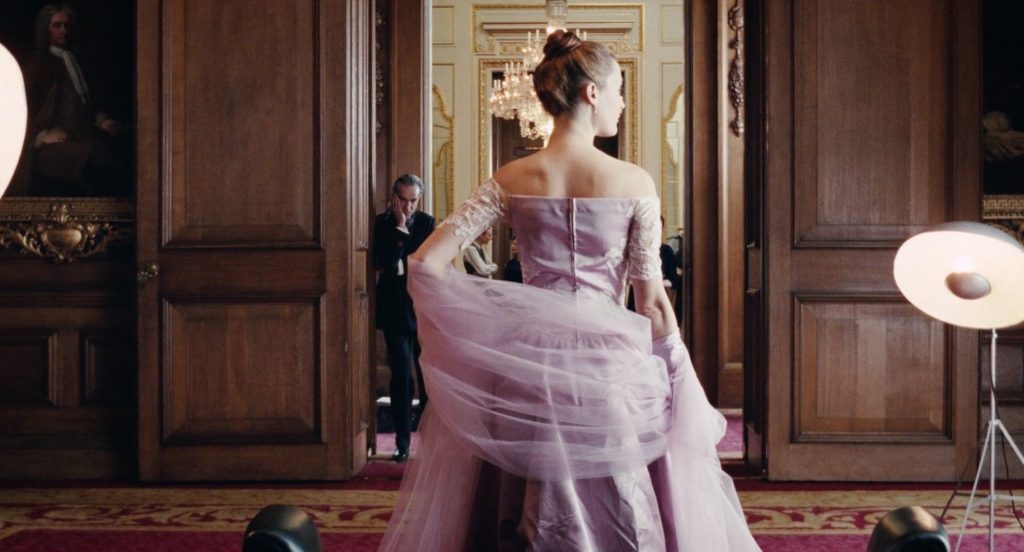
The opening titles of Paul Thomas Anderson’s latest film, Phantom Thread, enthrall the viewer into a tale of twisted love and obsessive passions through the delicacy and precision of the musical score – written by former guitarist of the band Radiohead, Johnny Greenwood. In Daniel Day Lewis’ final performance before retirement, he plays Reynolds Woodcook, a fashion designer consumed by his work. He dresses heiresses and princesses in his elegant and impressive London townhouse alongside his loyal sister Cyril, played by Leslie Manville, and together they preside over their team with fanatical efficiency. He is a man too preoccupied with his own work to worry about the trivial feelings of others, like the women he sees before meeting Alma.
“Reynolds has made my dreams come true. And I have given him what he desires most in return… Every piece of me.” These words, softly spoken, by Alma, Reynold’s lover and muse, break the haunting melody of the music to begin the film and speak volumes to the impossible expectations of a man accustomed to getting his way. Reynolds first meets Alma, played by Vicky Krieps, as she is waiting tables in a quaint hotel in the English countryside. Neither of them would realize that from the moments when he steals her notepad after she wrote his extensive order down, challenges her to bring the correct order, and she delivers it exactly as he detailed, that both of them were hooked into a relationship which would shake both their carefully crafted worlds.
 Both performances of master and muse not only complement one another but feed off the other’s energy. Lewis spent months meticulously constructing his character, while cultivating sewing skills which would impress any seasoned professional. His formidable performance is accented by the exquisite acting of Krieps. Her character, although more delicate, is equally as ardent as her counterpart. The scenes between them are the most emotive, fiery, and captivating.
Both performances of master and muse not only complement one another but feed off the other’s energy. Lewis spent months meticulously constructing his character, while cultivating sewing skills which would impress any seasoned professional. His formidable performance is accented by the exquisite acting of Krieps. Her character, although more delicate, is equally as ardent as her counterpart. The scenes between them are the most emotive, fiery, and captivating.
Phantom Thread also reunites the genius of Daniel Day Lewis with director Paul Thomas Anderson, after their previous work on the critically acclaimed There Will Be Blood, which garnered them an Oscar nomination for direction and a win for acting. Both were recently announced, this Tuesday to have been nominated once again. There Will Be Blood was powerful and resonant in its manner of captivating audiences through its moments of silence and impressive cinematography; Phantom Thread holds a similar sort of influence as the cinematography of this film was also done by Anderson. It carries a muted beauty within the still moments when the camera pans over empty rooms, but behind the stillness lies an underlying threat – as if the room anticipates some sort of commotion.
Even though this is not a movie about fashion, the costume design by Mark Bridges is worthy of note for its sheer simplistic and dramatic elegance. Reynolds holds a disdain for ‘chicness’ because he believes it is fleeting. His designs are purely based on a need to produce timeless art on a human form, but they are domineering. Bridges thus chose fabrics and colors that are heavier; he uses darker shades of blue, pink, red and purple among other color pallets. Alma, on the other hand, comes into his world with a lighter and fresher take on fashion. Her opinions clash with Reynolds in a way that is heard through the varying musical compositions – sometimes playful and other times haunting – and in the screenwriting. Their back and forth dialogue is brilliantly fashioned to demonstrate the conflict, humor, charm, chemistry, toxicity, obsession, and complicated nature of the relationship between them.
 It is a film which stands out in performances, music, costuming, direction, and story among other things which all work together to cast a spell on its audience. Things take a turn for the unexpected and will leave viewers questioning the nature of love, relationships, and the lengths people will reach to keep their partners bound to them. The line between the care shown through love and the abuse excused by it is dangerously transmutable.
It is a film which stands out in performances, music, costuming, direction, and story among other things which all work together to cast a spell on its audience. Things take a turn for the unexpected and will leave viewers questioning the nature of love, relationships, and the lengths people will reach to keep their partners bound to them. The line between the care shown through love and the abuse excused by it is dangerously transmutable.
 Kimberly Morles is a Senior at FIU majoring in English. She is pursuing a certificate in Exile and Film Studies.
Kimberly Morles is a Senior at FIU majoring in English. She is pursuing a certificate in Exile and Film Studies.
